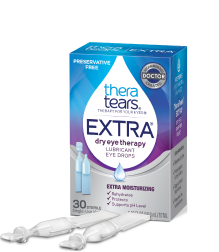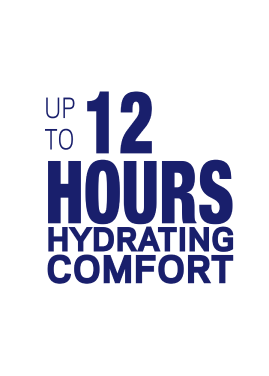Science-Backed Hydration™

Is There a Link Between Hormonal Changes and Dry Eyes?
When you think of menopause, you probably think of hot flashes, changes in mood, and night sweats. However, one of the most common conditions for women over 50 is dry eye.
It can be frustrating to experience so many bodily changes during menopause. However, learning about the connection between menopause and dry eyes will help prepare you to take care of your eyes as you enter this new chapter in your life.
Keep reading to understand the link between hormones and the eyes, and how you can treat and soothe your dry eye symptoms. *
How do hormones affect your eyes?
Hormones act as chemical messengers that move all throughout the body. We even have hormonal receptors within our eyes, so hormone changes are likely to affect the stability of our eyes.
The androgen hormone (testosterone) and the estrogen hormone have receptors within the meibomian and lacrimal glands in the eyelids, the oil and fluid glands, respectively. A disruption in these hormone levels could affect the eyes and may even cause a dry eye condition.
What is the link between dry eye and menopause?
Women over the age of 50are twice as likely to have dry eyes in comparison to men. During menopause, the body produces less estrogen, androgen, and progesterone. Many sex hormones influence the ocular surface of the eye that keeps it stable, such as producing tears, draining tears, and evaporating tears.
There are estrogen and androgen receptors in the oil and fluid glands of your eyes. The oil glands help keep your tears moist, which is necessary for lubricating the eyes. The fluid glands affect how many tears you release, which also hydrates and protects your eyes.
So, if these hormone levels decrease, it can influence your tear production, possibly leading to dry eye.
Are dry eyes a pregnancy symptom?
Dry eyes can be a pregnancy symptom for some women due to changes in estrogen and other fluctuating hormone levels. The changes in estrogen can affect the quality of your tears, including if they moisturize well or evaporate too quickly.
Although it is less common, menstruation is also linked to dry eye. The influx of estrogen at the beginning of the menstruation cycle could disrupt the tear production and tear quality. Any drastic changes in tear quality could have a negative impact on your eyes.
How to manage your menopause and dry eye condition
Thankfully, there is good news for menopausal women looking for relief. By using a variety of methods, both over-the-counter products and lifestyle changes, you can help lessen the effects of your dry eye condition onset by menopause.
Diet
It has long been encouraged that individuals with dry eyes should add more Omega-3s to their daily diet. Omega-3s may help increase oils in the tear film, which helps keep tears in the eyes for longer. Omega-3s are also known to decrease inflammation in the body and can help reduce inflammation caused by a dry eye condition. A study found that a diet rich in Omega-3 fatty acids is an effective therapy for dry eye syndrome. You can also add an Omega-3 supplement to your daily routine.
Lubricant Eye Drops
Lubricant eye drops can help you find relief from dry eye symptoms. Eye drops mimic healthy tears, so they can help lubricate and maintain moisture in your eyes. Any added moisture will reduce dry eye discomfort.
Sleep
Getting enough sleep can positively impact many aspects of your health, including improving your dry eye condition. Sleep deprivation can cause inflammation of the eyes and produce fewer tears. Getting at least seven to eight hours of sleep is essential for the overall health of older adults.
Limit Screen Time
Technology and screens are everywhere. However, the overuse of digital screens could have a negative impact on our eye health. Limit your screen time and remember to blink while using a computer, reading, or driving for long periods of time.
Learning how to take care of your eyes as you get older is important for any individual, but especially for women. The changes in hormone levels can affect tear production and quality, so taking the necessary precautions to keep your eyes healthy and nourished is very important for women.
*This website is provided for educational and informational purposes only and does not constitute providing medical advice or professional services. The information provided should not be used for diagnosing or treating a health problem or disease, and you should always seek the guidance of your doctor or other qualified health professional with any questions you may have regarding your health or a medical condition.
EXTRAordinary relief, now available in preservative free vials
TheraTears EXTRA dry eye therapy

EXTRAordinary relief, now available in preservative free vials

